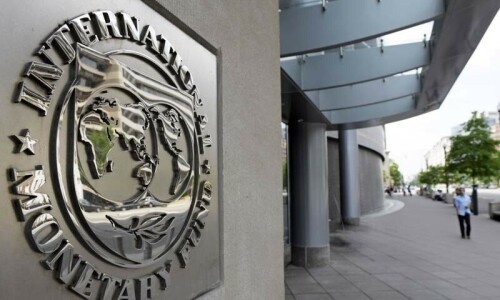FRANKFURT, Oct 23: The European Central Bank has embarked on a rate-cutting path in light of a deteriorating economic climate that has put inflation fears on the back burner for now.
“We have not changed our primary mandate, which is the stability of prices in the medium term,” ECB governing council member Jose Manuel Gonzalez-Paramo told the Irish Independent newspaper on Thursday in an interview.
But “we are in a position to diminish rates without adding to inflationary risks in the medium term,” he added.
For the Spaniard, sombre economic perspectives within the eurozone as elsewhere around the world, along with falling oil prices that temper inflation pressures, free the ECB’s hands to lower interest rates.
It would be hard to be any clearer: it’s a way of announcing rate cuts after one unveiled on October 8, Commerzbank economist Michel Schubert said. Caught by the financial crisis, the ECB had to do an abrupt about face.
In July it decided to raise its main lending rate to combat the danger of a price spiral as inflation hit a record 4.0 per cent, even though the economy already showed signs of weakness.
Three months later, the ECB cut the rate by a half percentage point to 3.75 per cent as part of a concerted move by central banks amid the worst financial crisis since the Great Depression and serious risks that credit markets would freeze solid.
But the ECB still has room to act alone. Inflation is currently at 3.6 per cent, well above the bank’s target of just below 2.0 per cent, but should decrease progressively.
The eurozone economy, following a contraction of 0.2 per cent in the second quarter, has gotten more bad news since.
On Thursday, the European statistics office said that eurozone industrial orders had fallen by 1.2 per cent in August from the previous month.
The impact of the financial crisis in the United States and the collapse of financial markets is beginning to affect the real economy.
Poor quarterly results, with auto manufactures out in front have offered more proof.
The ECB will cut its rates by another “50 basis points this year, followed by further cuts in 2009,” Schubert forecast, a view held by several analysts.
The euro’s fall against the dollar, which in other times might cause problems, won’t change much, and will certainly “not prevent further ECB easing this year and early 2009,” said Bank of America senior economist Holger Schmieding.
The euro, which was changing hands for a little more than $1.28 on Thursday, has lost more than 20 per cent from its record high in mid July of $1.6038.
When the euro falls in value, products billed in dollars like oil raise energy costs for households and fuel inflation.
But since the price of raw materials fall at the same time, the effect is balanced out.
“In the context of falling export demand and falling commodity prices, the inflationary impact on Europe of a stronger dollar is almost negligible, in my view,” Schmieding said.—AFP










































Dear visitor, the comments section is undergoing an overhaul and will return soon.